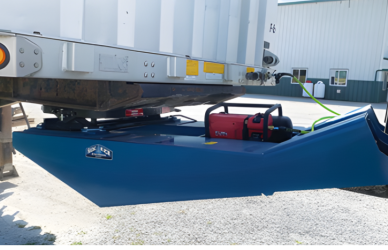Dry van trucking is one of the most common and versatile types of freight transportation. It involves using a dry van trailer to transport non-perishable goods, offering significant advantages in terms of protection and flexibility. This guide will provide you with a comprehensive overview of dry van trucking, including its benefits, operational insights, and essential tips for drivers.
What is Dry Van Trucking?
Dry van trucking refers to the use of a dry van trailer—an enclosed, box-like trailer with no temperature control—to transport goods. Unlike refrigerated trailers or flatbeds, dry vans provide a secure environment for cargo, protecting it from weather and other external factors.
Key Benefits of Dry Van Trucking
- Versatility
Dry vans are used to transport a wide range of products, from electronics and clothing to furniture and industrial equipment. Their enclosed design makes them suitable for most types of cargo that don’t require temperature control. - Cargo Protection
The enclosed nature of dry van trailers shields goods from weather conditions, theft, and damage. This makes them an ideal choice for shipping valuable or delicate items. - Cost-Effectiveness
Dry van trucking is often more cost-effective compared to refrigerated or flatbed trucking. The absence of complex cooling systems and specialized equipment reduces operational costs. - Wide Availability
Dry van trailers are widely available, and many trucking companies operate fleets of dry van trucks. This availability ensures that drivers have access to a variety of job opportunities and routes.
How Dry Van Trucking Works
- Loading
Goods are loaded into the dry van trailer through rear doors. Proper loading techniques are crucial to ensure cargo stability and prevent damage during transit. - Transport
The dry van truck transports the cargo to its destination. During transport, drivers must adhere to safety regulations, including proper securement of cargo and adherence to weight limits. - Unloading
Upon arrival, the dry van trailer is unloaded, and the goods are delivered to their final destination. Efficient unloading practices are important for maintaining a smooth operation.
Tips for Dry Van Trucking Drivers
- Pre-Trip Inspection
Always conduct a thorough pre-trip inspection of the trailer and truck to ensure everything is in working order. Check for any signs of damage or maintenance issues. - Proper Loading Techniques
Use proper loading techniques to distribute the weight evenly and secure the cargo. This helps prevent shifting during transit and reduces the risk of accidents. - Adherence to Regulations
Stay informed about and comply with regulations related to weight limits, safety standards, and other legal requirements. Compliance ensures smooth operations and avoids penalties. - Maintain Communication
Keep open lines of communication with dispatchers and customers. Timely updates on your location and any issues encountered during transit can help manage expectations and resolve problems quickly. - Regular Maintenance
Regularly maintain your truck and trailer to ensure optimal performance and safety. Address any maintenance issues promptly to avoid breakdowns and delays.
The Future of Dry Van Trucking
As the transportation industry evolves, dry van trucking continues to play a vital role. Advances in technology, such as GPS tracking and fleet management systems, are enhancing efficiency and safety in dry van operations. Additionally, sustainable practices and fuel-efficient technologies are becoming increasingly important in reducing the environmental impact of trucking.
Dry van trucking remains a reliable and cost-effective method for transporting goods across various industries. Understanding its benefits, operational aspects, and best practices can help drivers maximize their efficiency and ensure safe and successful deliveries.











